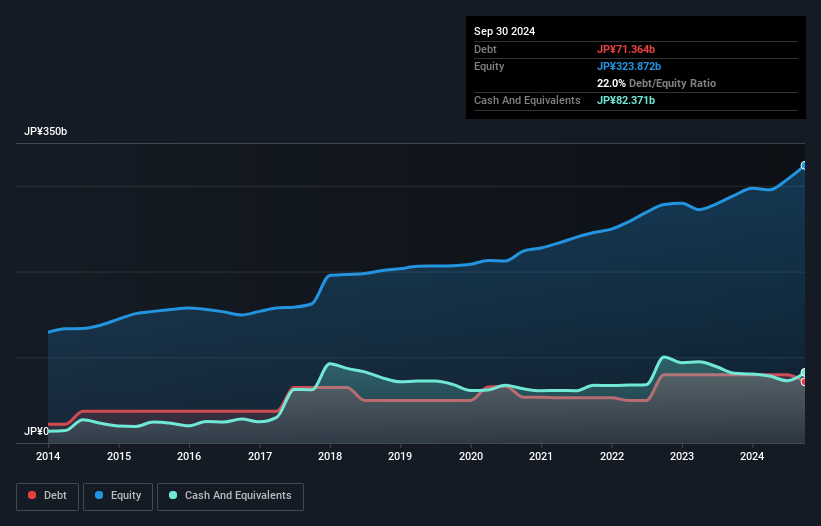These 4 Measures Indicate That Tsumura (TSE:4540) Is Using Debt Reasonably Well
Howard Marks put it nicely when he said that, rather than worrying about share price volatility, 'The possibility of permanent loss is the risk I worry about... and every practical investor I know worries about.' It's only natural to consider a company's balance sheet when you examine how risky it is, since debt is often involved when a business collapses. We note that Tsumura & Co. (TSE:4540) does have debt on its balance sheet. But is this debt a concern to shareholders?
When Is Debt A Problem?
Generally speaking, debt only becomes a real problem when a company can't easily pay it off, either by raising capital or with its own cash flow. Ultimately, if the company can't fulfill its legal obligations to repay debt, shareholders could walk away with nothing. However, a more common (but still painful) scenario is that it has to raise new equity capital at a low price, thus permanently diluting shareholders. Having said that, the most common situation is where a company manages its debt reasonably well - and to its own advantage. The first step when considering a company's debt levels is to consider its cash and debt together.
See our latest analysis for Tsumura
How Much Debt Does Tsumura Carry?
You can click the graphic below for the historical numbers, but it shows that Tsumura had JP¥71.4b of debt in September 2024, down from JP¥79.7b, one year before. But on the other hand it also has JP¥82.4b in cash, leading to a JP¥11.0b net cash position.

How Strong Is Tsumura's Balance Sheet?
We can see from the most recent balance sheet that Tsumura had liabilities of JP¥55.7b falling due within a year, and liabilities of JP¥73.9b due beyond that. Offsetting these obligations, it had cash of JP¥82.4b as well as receivables valued at JP¥66.8b due within 12 months. So it can boast JP¥19.6b more liquid assets than total liabilities.
This surplus suggests that Tsumura has a conservative balance sheet, and could probably eliminate its debt without much difficulty. Simply put, the fact that Tsumura has more cash than debt is arguably a good indication that it can manage its debt safely.
On top of that, Tsumura grew its EBIT by 59% over the last twelve months, and that growth will make it easier to handle its debt. The balance sheet is clearly the area to focus on when you are analysing debt. But it is future earnings, more than anything, that will determine Tsumura's ability to maintain a healthy balance sheet going forward. So if you're focused on the future you can check out this free report showing analyst profit forecasts.
But our final consideration is also important, because a company cannot pay debt with paper profits; it needs cold hard cash. Tsumura may have net cash on the balance sheet, but it is still interesting to look at how well the business converts its earnings before interest and tax (EBIT) to free cash flow, because that will influence both its need for, and its capacity to manage debt. Over the last three years, Tsumura recorded negative free cash flow, in total. Debt is usually more expensive, and almost always more risky in the hands of a company with negative free cash flow. Shareholders ought to hope for an improvement.
Summing Up
While it is always sensible to investigate a company's debt, in this case Tsumura has JP¥11.0b in net cash and a decent-looking balance sheet. And we liked the look of last year's 59% year-on-year EBIT growth. So we don't think Tsumura's use of debt is risky. When analysing debt levels, the balance sheet is the obvious place to start. However, not all investment risk resides within the balance sheet - far from it. For example, we've discovered 1 warning sign for Tsumura that you should be aware of before investing here.
Of course, if you're the type of investor who prefers buying stocks without the burden of debt, then don't hesitate to discover our exclusive list of net cash growth stocks, today.
Valuation is complex, but we're here to simplify it.
Discover if Tsumura might be undervalued or overvalued with our detailed analysis, featuring fair value estimates, potential risks, dividends, insider trades, and its financial condition.
Access Free AnalysisHave feedback on this article? Concerned about the content? Get in touch with us directly. Alternatively, email editorial-team (at) simplywallst.com.
This article by Simply Wall St is general in nature. We provide commentary based on historical data and analyst forecasts only using an unbiased methodology and our articles are not intended to be financial advice. It does not constitute a recommendation to buy or sell any stock, and does not take account of your objectives, or your financial situation. We aim to bring you long-term focused analysis driven by fundamental data. Note that our analysis may not factor in the latest price-sensitive company announcements or qualitative material. Simply Wall St has no position in any stocks mentioned.
About TSE:4540
Tsumura
Engages in the production and sale of Kampo extract intermediates and granular Kampo formulations in Japan and internationally.
Excellent balance sheet established dividend payer.
Market Insights
Community Narratives


Recently Updated Narratives

TAV Havalimanlari Holding will fly high with 25.68% revenue growth


Fiducian: Compliance Clouds or Value Opportunity?


Q3 Outlook modestly optimistic
Popular Narratives


MicroVision will explode future revenue by 380.37% with a vision towards success


The company that turned a verb into a global necessity and basically runs the modern internet, digital ads, smartphones, maps, and AI.



